New developments in AI, August 12, 2025 update
This week’s AI developments highlight both opportunity and caution for SMB leaders—from new creative uses of AI in brainstorming and productivity to emerging risks around privacy, product instability, and organizational change. Executives will also find insights on shifting talent priorities, evolving market strategies, and the cultural shifts shaping how businesses adopt and trust AI tools.

August 8, 2025 episode of AI For Humans, featuring GPT-5’s official debut and other major AI developments:
Executive Summary: GPT-5 Arrives — Smarter, Faster, and Free
OpenAI has officially launched GPT-5, branding it as the best and most accessible AI model yet. GPT-5 consolidates previous models into a single, free version available across platforms. While traditional benchmarks show only modest gains, user experiences reveal significant improvements in speed, reasoning, hallucination reduction, and tool use. GPT-5 is especially transformative in tasks involving complex coding and health-related problem-solving, offering powerful reasoning that outpaces many earlier models in practical application.
The episode emphasizes the importance of “vibes” — how GPT-5 performs in real-world usage — over benchmarks. Coders and non-programmers alike report that GPT-5 simply “does the thing,” solving complex problems with little friction. A live coding demo showed GPT-5 building a fully playable game in minutes, highlighting both its performance speed and utility for development. The hosts also explore GPT-5’s new “personalities,” including adaptable voice responses and tonal customizations, plus new voice control options.
Beyond OpenAI, Google DeepMind unveiled Genie 3, a next-gen “world model” capable of generating interactive, memory-retaining 3D environments. Anthropic released Claude 4.1, 11 Labs dropped a licensed AI music model, and Elon Musk’s Grok launched a real-time video model with controversy-prone “spicy” settings. Meanwhile, Unitree Robotics’ latest robot dog showcases physical prowess and raises ethical questions about autonomous machines in public spaces.
Overall, this episode reflects the rapidly evolving landscape of AI: OpenAI focuses on mass deployment, Google continues to invest in advanced simulation and research, and open-source models grow more capable. The stakes for creativity, privacy, productivity, and governance are escalating — especially as these tools become faster, more accessible, and increasingly embedded into business and daily life.
Relevance for Business
GPT-5 represents a major leap in accessible, agentic AI — especially for companies with limited budgets or technical staff. Its speed and versatility make it an immediate productivity tool for SMBs in coding, document generation, customer support, healthcare, and more. The trend toward open-weight and local models also enables greater privacy, control, and cost efficiency. Meanwhile, immersive AI environments (like Google’s Genie 3) foreshadow future user interfaces for training, retail, and collaboration.
Calls to Action for SMB Executives & Managers
- Experiment with GPT-5: Test its capabilities in real workflows — coding, writing, customer service, etc. It’s free and available now.
- Audit existing AI tools: Replace older models with GPT-5 where appropriate to boost performance and reduce hallucinations.
- Train teams on agentic AI: Introduce staff to new GPT-5 functionalities like tool use, long context, and custom personalities.
- Consider privacy-enhanced open models: Evaluate OpenAI’s new open-weight models or explore running models locally for secure data handling.
- Monitor immersive AI developments: Begin exploring applications for generative world models (like Genie 3) in training, simulations, or gaming.
- Assess voice and music generation tools: Use Eleven Labs and similar platforms to create soundscapes, training prompts, or marketing content.
- Stay informed on AI governance: As models gain power, prioritize ethics, compliance, and cross-checking sources across platforms.
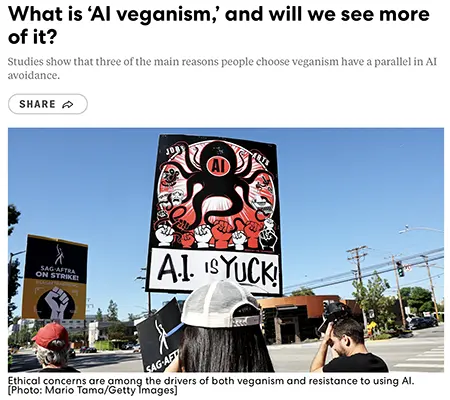
What is ‘AI Veganism,’ and Will We See More of It?
Executive Summary:
Fast Company explores the emerging movement of “AI veganism”—a conscious decision to avoid AI-generated tools, content, and services. Much like dietary veganism, motivations range from ethical concerns (e.g., labor exploitation in AI data labeling), to protecting human-authored creativity, to resisting the spread of misinformation. The article notes that AI veganism could influence consumer behavior, branding, and content strategies in industries like publishing, design, and entertainment. Companies may face pressure to disclose when AI is used and offer “human-made” alternatives as a differentiator in a crowded AI-driven marketplace.
💼 Relevance for Business:
If consumer segments begin actively rejecting AI content, SMBs must adapt with transparent labeling, human-created options, and hybrid models to maintain trust and market share.
✅ Calls to Action: Develop messaging that addresses authenticity concerns. Clearly label AI-generated vs. human-created content. Offer customers choice in content or product origins. Monitor consumer sentiment toward AI in your industry.
https://www.fastcompany.com/91376472/ai-veganism-research-explainer: Summaries, August 12, 2025 Week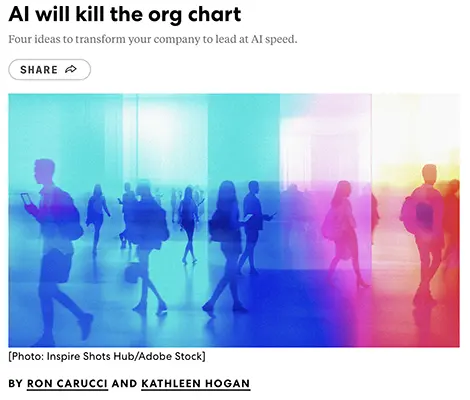
🏢 AI Will Kill the Org Chart – Fast Company
Executive Summary:
Traditional hierarchical structures may soon become obsolete in the age of AI. Authors Ron Carucci and Kathleen Hogan argue that AI-driven organizations must prioritize impact over rank, valuing contributions rather than titles. Microsoft’s leadership model, highlighted in the article, focuses on three manager expectations: cultivating adaptability, enabling cross-functional collaboration, and fostering continuous learning. AI’s rapid pace demands flatter, more agile structures where decision-making is decentralized, talent flows across teams, and career progression is tied to outcomes, not promotions. The authors predict that companies clinging to rigid org charts will struggle to keep up with competitors leveraging fluid, AI-optimized structures.
💼 Relevance for Business:
This shift will require rethinking leadership pipelines, performance reviews, and team design to match AI’s speed and flexibility.
✅ Calls to Action:
🚀 Train leaders to manage adaptability and digital collaboration at scale.
🔄 Experiment with project-based teams instead of static departments.
📊 Measure performance by outcomes and cross-functional contributions.
https://www.fastcompany.com/91361724/ai-will-kill-the-org-chart: Summaries, August 12, 2025 Week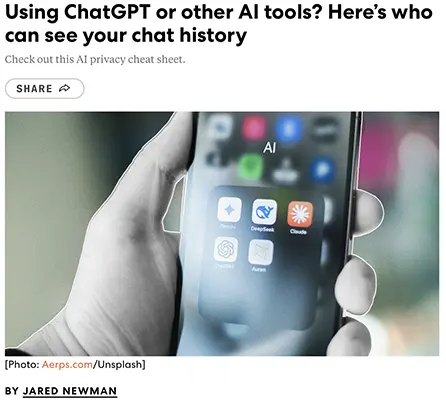
Using ChatGPT or Other AI Tools? Here’s Who Can See Your Chat History
Executive Summary:
Fast Company warns that many AI providers store and may review chat logs to improve models, with employees, contractors, or external auditors sometimes gaining access. Even seemingly harmless queries can contain proprietary details that, if exposed, could reveal strategic plans or sensitive customer data. The article explains how data is handled differently across free, pro, and enterprise AI subscriptions, with enterprise offerings typically providing stronger privacy protections. It also provides examples of real-world incidents where chat data was inadvertently exposed or mishandled, reinforcing the need for clear internal AI usage policies.
💼 Relevance for Business:
This underscores the need for clear AI governance policies and data hygiene when using third-party AI tools. Unintentional disclosure of confidential data could result in competitive or legal risk.
✅ Calls to Action:
📚 Train employees on AI data security best practices.
🔒 Limit sharing of sensitive data in AI chats.
📜 Review vendor privacy policies regularly.
🛠 Use enterprise AI plans with stronger data controls.
https://www.fastcompany.com/91379336/using-chatgpt-or-other-ai-tools-heres-who-can-see-your-chat-history: Summaries, August 12, 2025 Week
🌐 The Entire Internet Is Reverting to Beta – The Atlantic
Executive Summary:
The article warns that products, platforms, and online experiences are increasingly “unfinished”, shifting from polished releases to perpetual beta mode. This trend—fueled by AI-driven experimentation, rapid feature testing, and market share races—means more frequent bugs, shifting interfaces, and unpredictable experiences, leaving users feeling like permanent test subjects.
AI accelerates iteration cycles, but deploying features without adequate testing risks eroding trust. Companies are embracing a ship now, fix later approach, but it can cause user fatigue, loyalty erosion, and data privacy concerns. While speed offers a competitive edge, customer patience is finite.
💡 Relevance for Business:
- Constant iteration can be a competitive advantage—but may cost brand trust.
- Instability drives users to competitors if overused.
- Highlights the value of transparent communication during rapid change.
✅ Calls to Action:
Be transparent about upcoming changes and known issues.
Balance speed with quality assurance to protect trust.
Create opt-in beta programs for early adopters.
https://www.theatlantic.com/technology/archive/2025/06/ai-janky-web/683228/: Summaries, August 12, 2025 Week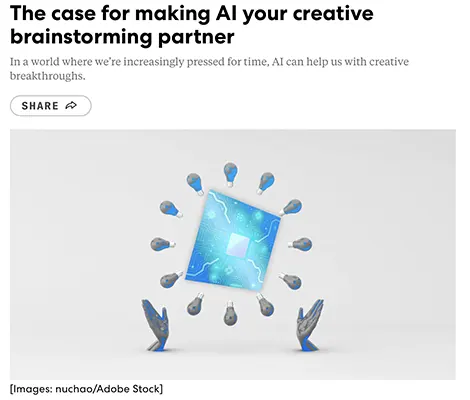
🎨 The Case for Making AI Your Creative Brainstorming Partner – Fast Company
Executive Summary:
Creativity, once thought to be humanity’s untouchable skill, is now constrained by the time pressures of modern work. The article argues that AI can be a powerful creative accelerator, eliminating tedious, energy-draining brainstorming tasks—from generating variations to analyzing ideas—so humans can focus on refining and applying them strategically.
The author describes the “decade of the creative bottleneck”, where bureaucracy and unproductive meetings stifle innovation. AI breaks these logjams, producing incremental gains that compound into breakthroughs. Crucially, AI should augment human judgment, not replace it—machines handle brute-force ideation, while people bring cultural nuance and emotional intelligence.
💡 Relevance for Business:
- AI is a force multiplier for innovation, not a replacement for creative teams.
- Encourages AI integration in ideation workflows for speed and scale.
- Competitive advantage will come from human-AI hybrid teams.
✅ Calls to Action:
Track creative cycle times before and after AI integration to measure ROI.
Pilot AI brainstorming tools for marketing, product design, and strategy.
Train teams to use AI as a starting point, not an endpoint.
https://www.fastcompany.com/91372380/the-case-for-making-ai-your-creative-brainstorming-partner: Summaries, August 12, 2025 Week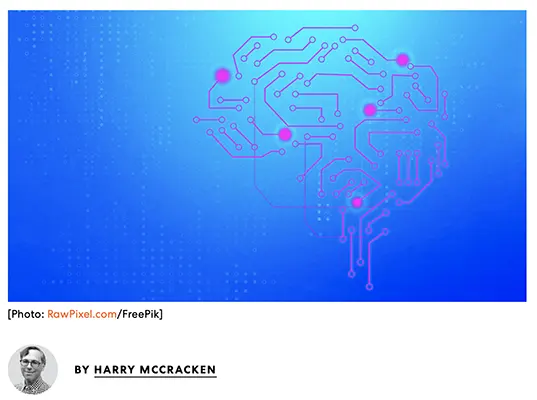
🕵 The Trouble with Agent, ChatGPT’s New Web-Browsing AI
Executive Summary:
Fast Company investigates the early rollout of ChatGPT’s “Agent” feature, which autonomously browses the web to gather information and complete tasks. While the tool promises time-saving automation for research, competitive analysis, and market scanning, early users report issues such as irrelevant data collection, misinterpretation of context, and occasional overreach into unintended sites or actions. OpenAI acknowledges the challenges of balancing autonomy with reliability and emphasizes ongoing refinement. For businesses, this represents both a glimpse of the future of AI agents and a cautionary tale about trusting them without rigorous human oversight.
💼 Relevance for Business:
The feature shows promise for automating research and data gathering, but reliability issues mean SMBs must proceed cautiously and maintain human oversight.
✅ Calls to Action:
📚 Train staff on prompt design for web-browsing AIs.I
🛡 Implement review processes for AI-collected information.
🧪 Test AI browsing tools in controlled scenarios before full deployment.
⚖ Balance automation speed with accuracy checks.
https://www.fastcompany.com/91376887/openai-chatgpt-agent: Summaries, August 12, 2025 Week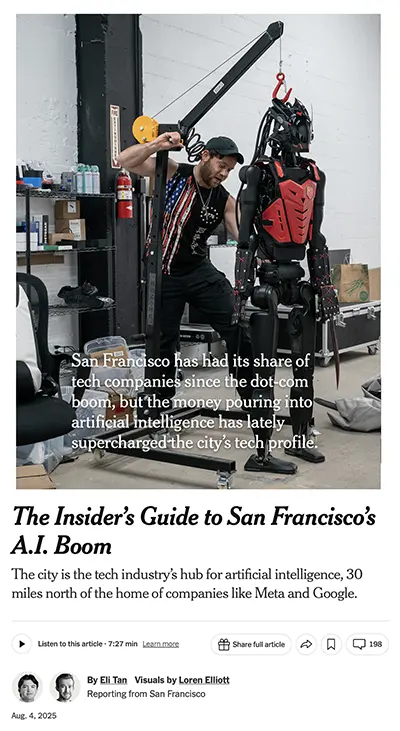
🏙 The Insider’s Guide to San Francisco’s A.I. Boom
Executive Summary:
The New York Times takes readers inside San Francisco’s transformation into the world’s AI capital, driven by a surge of startups, tech giants, and venture capital investment. Cafés are filled with laptop-wielding engineers, office spaces are being reclaimed by AI firms, and industry meetups are drawing hundreds of participants weekly. The city’s AI boom is compared to its dot-com era, but with a sharper focus on foundational technologies like large language models and robotics. The article also highlights the unique networking culture, where proximity to top talent and decision-makers accelerates partnerships, funding deals, and product launches.
💼 Relevance for Business:
SMBs can tap into this innovation hub for partnerships, recruitment, and market intelligence. Being connected to the pulse of AI development can provide early access to trends and talent.
✅ Calls to Action:
🔍 Identify niche markets created by AI disruption.
🤝 Network with AI startups and accelerators in emerging hubs.
📈 Monitor investment and hiring trends in AI hotspots.
🧲 Recruit remote talent from high-density AI regions.
https://www.nytimes.com/2025/08/04/technology/ai-boom-san-francisco.html?searchResultPosition=1: Summaries, August 12, 2025 Week
💼 Thanks for Your $1 Billion Job Offer, Mark Zuckerberg. I’m Gonna Pass. – Wall Street Journal
Executive Summary:
In this first-person piece, the author humorously declines an imagined $1 billion job offer from Mark Zuckerberg, using it as a satirical lens to explore tech industry hype, corporate culture, and personal values. The narrative pokes fun at the allure of enormous salaries, lavish perks, and the prestige of working at a major tech company, while highlighting the trade-offs: loss of autonomy, creative compromise, and the relentless pace of high-profile corporate life. Instead of chasing money, the author emphasizes freedom, purpose, and mental well-being as more valuable.
This reflects a cultural shift in talent priorities—the notion that bigger is not always better—and challenges employers to rethink what truly attracts top talent.
💡 Relevance for Business:
- Top talent increasingly values autonomy, meaningful work, and flexibility over maximum pay.
- Signals a shift in tech culture away from unquestioned corporate dominance.
- Reminds employers to consider lifestyle and personal motivations in compensation strategies.
✅ Calls to Action:
Engage employees in open dialogue about career goals beyond compensation.
Reassess recruitment messaging to emphasize purpose and culture alongside pay.
Offer flexible work arrangements to attract high-performing talent.
https://www.wsj.com/tech/ai/meta-zuckerberg-ai-recruiting-fail-e6107555?mod=djem10point: Summaries, August 12, 2025 Week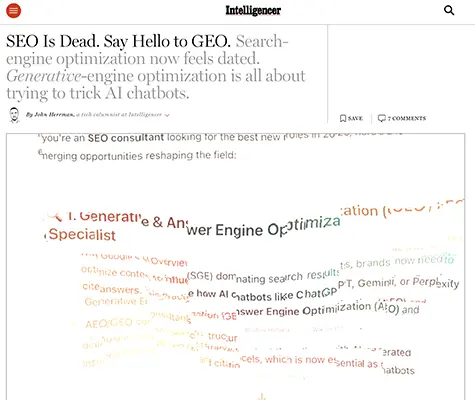
🌍 SEO Is Dead. Say Hello to GEO – Fast Company
Executive Summary:
The article argues that traditional SEO is losing influence as AI tools and generative search engines change how people discover information. The emerging model, Generative Engine Optimization (GEO), focuses on optimizing for AI-generated answers rather than static search rankings. Businesses must now consider how their content is interpreted, summarized, and served by AI assistants. Early GEO strategies include structuring data for AI comprehension, using natural language formats, and creating content that AI can confidently synthesize. The shift represents a fundamental change in digital visibility strategy.
💼 Relevance for Business:
Companies relying on SEO must adapt quickly to AI-driven search models or risk losing visibility in the next era of online discovery.
✅ Calls to Action:
🚀 Experiment with GEO-focused strategies to maintain brand presence.
🧭 Audit content for AI readability and relevance.
📝 Use conversational formats that AI tools can easily summarize.
https://nymag.com/intelligencer/article/seo-is-dead-say-hello-to-geo.html: Summaries, August 12, 2025 Week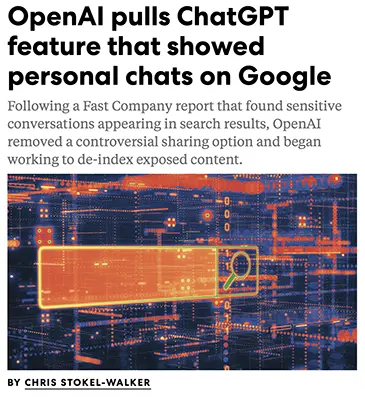
🔍 OpenAI Pulls ChatGPT Feature That Showed Personal Chats on Google – Fast Company
Executive Summary:
OpenAI quietly rolled back a controversial ChatGPT feature that made public chats searchable on Google. While intended to increase discoverability, the move sparked backlash over privacy risks and unintended exposure of sensitive information. Users expressed concerns about workplace data, personal queries, and intellectual property becoming easily accessible. OpenAI’s quick reversal underscores a core tension in AI product design: balancing openness with user trust. For businesses, the incident is a cautionary tale about feature rollout without fully anticipating privacy implications.
💼 Relevance for Business:
AI tools can expose sensitive data if safeguards aren’t built in. Leaders must ensure privacy-first product design and transparent communication with users.
✅ Calls to Action:
🛠 Build policies to manage how AI-generated or AI-collected data is stored and shared.
🔒 Conduct a privacy risk assessment before launching new features.
📜 Create clear opt-in/opt-out controls for data visibility.
https://www.fastcompany.com/91378696/openai-pulls-chatgpt-feature-that-showed-personal-chats-on-google: Summaries, August 12, 2025 Week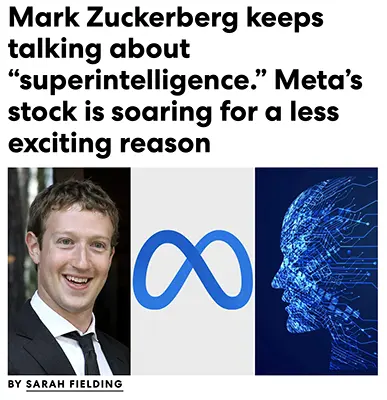
🧠 Mark Zuckerberg Keeps Talking About “Superintelligence” – Fast Company
Executive Summary:
Mark Zuckerberg has been vocal about Meta’s ambition for “superintelligence”, positioning the company as a leader in the AI arms race. However, the article reveals that Meta’s recent stock surge has less to do with futuristic AI breakthroughs and more to do with strong ad revenue growth and cost-cutting measures. While Zuckerberg’s rhetoric keeps Meta in the AI conversation, the business reality shows that investors are responding to solid fundamentals, not speculative tech promises. This serves as a reminder that hype and headlines don’t always drive market performance—execution does.
💼 Relevance for Business:
Focus on core business strengths while integrating AI, rather than relying on speculative future promises to drive growth or investor interest.
✅ Calls to Action:
📈 Communicate AI strategy alongside real business results to build credibility.
📊 Track market drivers—separate hype from actual performance metrics.
🧠 Invest in AI where it supports proven revenue streams.
https://www.fastcompany.com/91377949/mark-zuckerberg-keeps-talking-about-superintelligence-metas-stock-is-soaring-for-a-less-exciting-reason: Summaries, August 12, 2025 Week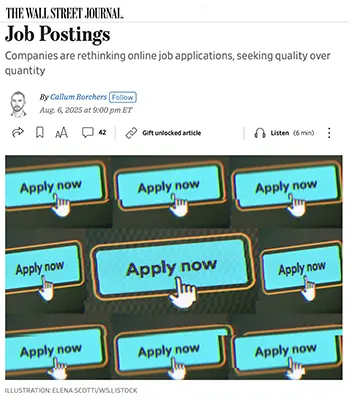
💼 How to Navigate the Jungle of Online Job Postings – The Wall Street Journal
Executive Summary:
The modern job search is a digital maze, where legitimate opportunities mix with spam, scams, and outdated listings. The article provides strategies for cutting through the noise, including using niche job boards, leveraging AI-powered search tools, and maintaining strong personal networks. A key warning is that overreliance on automated applications can backfire—human connection and tailored outreach still matter. The piece also highlights red flags to watch for, such as unrealistic salary ranges, vague descriptions, and requests for sensitive information. For employers, this is a window into how candidates experience the hiring process, and a call to stand out with clarity, authenticity, and efficiency.
💼 Relevance for Business:
In a competitive hiring market, clear and credible postings can attract better candidates faster while strengthening brand reputation.
✅ Calls to Action:
📢 Use both digital tools and human outreach to connect with top talent.
🖋 Write precise, transparent job descriptions to stand out in crowded listings.
🔍 Review postings for clarity and alignment with market expectations.
https://www.wsj.com/lifestyle/careers/how-to-navigate-the-jungle-of-online-job-postings-69902b11?mod=djem10point: Summaries, August 12, 2025 Week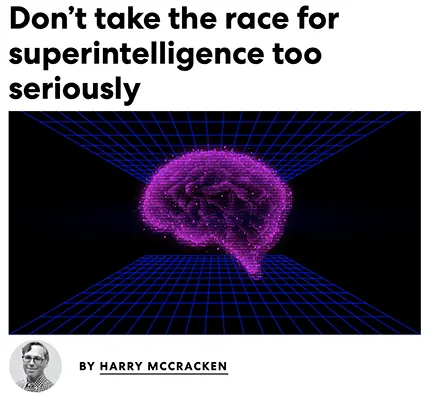
🧠 Don’t Take the Race for Superintelligence Too Seriously – Fast Company
Executive Summary:
In the rush toward artificial general intelligence (AGI) and “superintelligence,” many companies frame the race as an all-or-nothing sprint. This article urges a more measured, pragmatic view, arguing that the hype overshadows more immediate, tangible AI opportunities. Leaders interviewed stress that overemphasizing AGI timelines can distract from applying today’s AI to real-world challenges—like streamlining workflows, improving supply chains, and enhancing decision-making. The takeaway: sustainable AI strategy comes from balancing long-term vision with short-term, ROI-driven applications, avoiding the trap of chasing distant goals while neglecting current competitive advantages.
💼 Relevance for Business:
Businesses should temper ambition with action, ensuring resources aren’t consumed by speculative projects at the expense of proven AI implementations.
✅ Calls to Action:
🧭 Use AGI conversations to inspire, but not derail, tactical decision-making.
📅 Balance long-term AI research with current operational improvements.
📊 Measure ROI from today’s AI tools before scaling moonshot projects.
https://www.fastcompany.com/91363668/superintelligence: Summaries, August 12, 2025 Week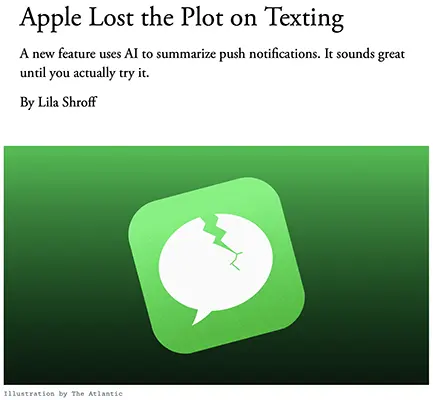
📱 Apple Lost the Plot on Texting – The Atlantic
Executive Summary:
For years, Apple’s iMessage has been a walled garden, keeping users inside its blue-bubble ecosystem. But as Google, Samsung, and others push RCS (Rich Communication Services) adoption, Apple’s resistance is starting to look less like strategy and more like stubbornness. This article argues that Apple’s once-groundbreaking messaging experience has become outdated and exclusionary, especially for cross-platform communication. The piece points out that Apple’s recent moves—such as finally agreeing to support RCS—are reactive, not innovative, suggesting a shift from market leader to follower. For businesses, this is a reminder that clinging to legacy advantages can quickly erode customer goodwill in the face of evolving standards.
💼 Relevance for Business:
Staying relevant means adapting to emerging standards before competitors force the change. Waiting too long risks turning innovation into damage control.
✅ Calls to Action:
📊 Track competitor adoption rates of emerging tech to inform strategy.
🔍 Audit customer communication channels for compatibility and user experience.
🚀 Proactively adopt industry standards to avoid reactive pivots.
https://www.theatlantic.com/technology/archive/2024/11/apple-intelligence-text-messages/680717/: Summaries, August 12, 2025 Week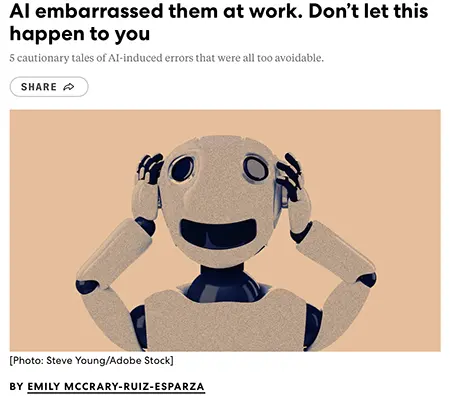
😳 AI Embarrassed Them at Work. Don’t Let This Happen to You – Fast Company
Executive Summary:
Misusing AI in professional settings can lead to serious reputational damage. The article shares real-world incidents of employees submitting AI-generated work riddled with factual errors, tone mismatches, or confidential data leaks. One marketing manager sent a client proposal written by ChatGPT without editing—it contained incorrect product details, damaging trust. Another executive’s email draft leaked sensitive merger information after being fed into a public AI tool. The central takeaway: AI can enhance output, but blind reliance without verification invites disaster. The piece advises adopting AI hygiene practices—including fact-checking, style adjustments, and using secure enterprise AI platforms.
💼 Relevance for Business:
Companies adopting AI must embed guardrails and training to ensure employees use these tools responsibly. The cost of AI mistakes can be far higher than the time saved.
✅ Calls to Action:
🧠 Train teams in prompt design and post-editing best practices.
🛡 Implement clear AI usage policies and confidentiality protocols.
🖋 Require human review of all AI-generated materials before external use.
https://www.fastcompany.com/91373292/ai-embarrassed-them-at-work-dont-let-this-happen-to-you: Summaries, August 12, 2025 Week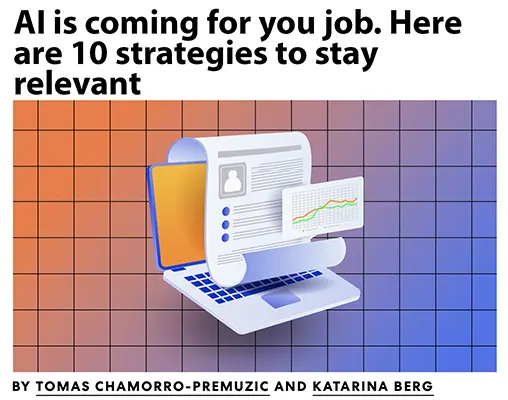
📌 10 Ways to Avoid Losing Your Job to AI – Fast Company
Executive Summary:
As AI adoption accelerates, job security increasingly depends on adaptability. This article outlines ten strategies to keep your career future-proof in the face of automation. Key recommendations include continual upskilling, embracing AI as a tool rather than resisting it, and focusing on human strengths like creativity, emotional intelligence, and strategic thinking. The author warns that ignoring AI’s impact or refusing to learn new tools can make you expendable. Case examples highlight professionals who safeguarded their roles by integrating AI into their workflows, as well as those who became obsolete by clinging to outdated methods. The message is clear: the most valuable employees will be those who blend human judgment with AI efficiency.
💼 Relevance for Business:
Leaders should note that AI isn’t just a cost-cutting tool—it’s reshaping the skills and mindsets needed in every role. Failing to prepare employees for AI integration could lead to talent loss, morale decline, and missed innovation opportunities.
✅ Calls to Action:
🤝 Encourage cross-functional projects to pair human insight with AI capabilities.
🔍 Audit team skill sets and identify AI-related gaps.
📚 Launch ongoing AI literacy and upskilling programs.
https://www.fastcompany.com/91324364/10-ways-to-avoid-losing-your-job-to-ai: Summaries, August 12, 2025 Week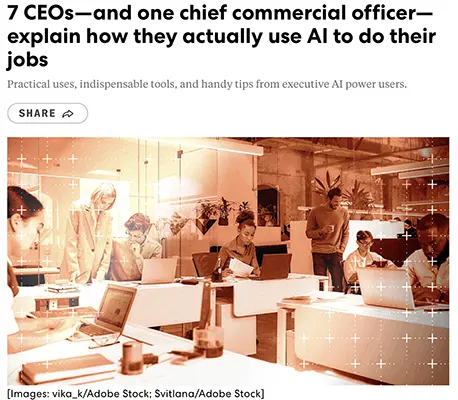
7 C-Level Executives Explain How They’re Using AI to Do Their Jobs
Executive Summary:
Fast Company profiles seven senior executives who are putting AI to work in tangible ways. CEOs use predictive analytics to make sharper strategic decisions. CFOs rely on AI forecasting to strengthen budgeting and risk analysis. CMOs are crafting targeted ad copy and fine-tuning customer engagement through generative AI. COOs automate supply chain monitoring, getting real-time alerts when issues arise. CTOs are embedding AI directly into their products. Across roles, these leaders emphasize that human oversight remains essential, adoption should be iterative and tested, and culture must adapt so teams embrace AI rather than fear it.
💼 Relevance for Business:
Hearing how peers apply AI gives SMB leaders practical adoption blueprints and illustrates that AI’s benefits extend beyond tech-heavy sectors.
✅ Calls to Action:
📈 Measure and share AI-driven performance gains internally.
🔍 Benchmark against industry AI use cases.
🤝 Encourage cross-department AI experimentation.
📚 Train leadership teams on AI strategy.
https://www.fastcompany.com/91372552/7-ceos-and-one-chief-commercial-officer-explain-how-they-actually-use-ai-to-do-their-jobs: Summaries, August 12, 2025 Week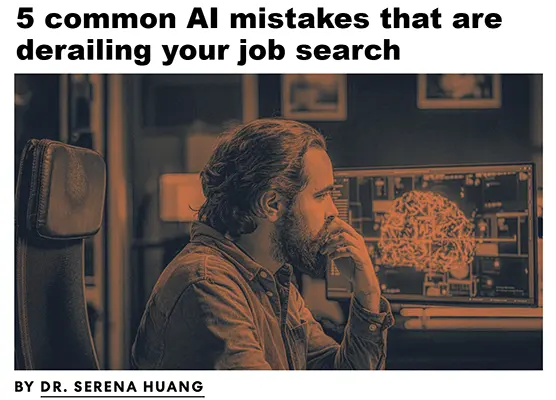
5 Common AI Mistakes That Are Derailing Your Job Search
Executive Summary:
Fast Company warns that while AI can be a powerful ally in a job hunt, it can also backfire when used poorly. The first trap is over-reliance on generic AI output, which results in bland resumes that fail to stand out. Another common mistake is failing to fact-check AI-generated content, risking embarrassing errors. Many applicants skip industry-specific keywords, making their resumes invisible to applicant tracking systems. Some misuse AI during interviews, delivering robotic, impersonal answers. And too often, candidates fail to personalize AI-assisted materials so they reflect authentic skills and experiences. The piece stresses that AI should enhance, not replace, the human touch in career advancement.
💼 Relevance for Business:
For SMBs hiring staff, awareness of these pitfalls can improve screening processes and help identify candidates who demonstrate both AI literacy and personal initiative.
✅ Calls to Action:
🛡 Verify information in AI-assisted candidate materials.
📝 Educate hiring teams on common AI-generated resume signs.
🧩 Encourage applicants to blend AI assistance with authentic input.
📊 Update hiring practices to account for AI-driven application trends.
https://www.fastcompany.com/91317926/5-common-ai-mistakes-that-are-derailing-your-job-search: Summaries, August 12, 2025 Week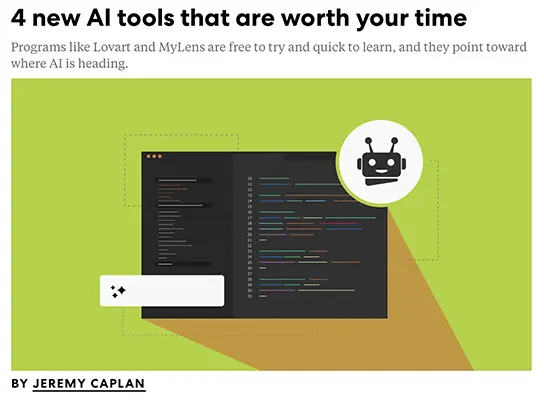
4 New AI Tools That Are Worth Your Time
Executive Summary:
Fast Company introduces four cutting-edge AI tools that are reshaping productivity across industries. One is a video creation platform that transforms simple scripts into professional-grade videos — no editing expertise required. Another is a meeting assistant that listens in, automatically summarizing discussions and extracting action itemsbefore syncing with your calendar. A third, an AI-powered code helper, writes and debugs code in real time, accelerating development cycles. Finally, a design generator whips up branded marketing assets in seconds, ensuring consistent visual identity without a design team. The article highlights how these tools help eliminate repetitive tasksand free up time for higher-value, creative work — but warns that successful adoption depends on integration planning and user training.
💼 Relevance for Business:
These tools offer SMBs opportunities to save time, cut costs, and increase creative output without expanding headcount, provided there’s clear adoption strategy and oversight.
✅ Calls to Action:
🔍 Ensure tool integration with existing workflows.
🧪 Pilot new AI tools in small teams before company-wide rollout.
📊 Measure time saved and ROI post-implementation.
📚 Provide onboarding and training to maximize adoption.
https://www.fastcompany.com/91375850/4-new-ai-tools-that-are-worth-your-time: Summaries, August 12, 2025 WeekConclusion for the week
As AI adoption accelerates, SMB leaders face a pivotal moment—balancing innovation with trust, speed with stability, and automation with human insight. The key takeaway from this week’s developments is clear: those who integrate AI thoughtfully, align it with business strategy, and remain agile in adapting to both risks and opportunities will be best positioned to thrive in the evolving digital economy.
↑ Back to Top
